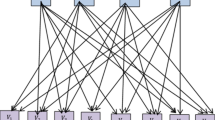Abstract
An efficient compact encoding process with the pipelining design of Low Density Parity Check (LDPC) Encoder with a two stage, three stage and Maximal Rate Pipelining (MRP) structures are proposed in this work. Comparatively, LDPC encoding is more complex than decoding. The complexity mainly referred to the mathematical computation involved in the design of LDPC encoder. There are several methods used to design reduced parity check matrix, one of the methods involved is the Gauss Elimination method. Conventional and wave pipelining techniques are implemented to overcome the disadvantages of the area, latency, etc., The designed architectures are synthesized in SYNOPSYS tool and implemented in the XC3S-250E FPGA device. The overheads like power and area are efficiently reduced by wave pipelining and their efficiency can be proved by synthesis report. This showcases that the LDPC Encoders require less memory by using MRP structure.












Similar content being viewed by others
References
Abdessalem, M. B., Zribi, A., Matsumoto, T., Dupraz, E., & Bouallege, E. (2020). LDPC-based joint source channel coding and decoding strategies relay cooperative communications. Physical Communication, 38, 100947.
Gallager, R. G. (1962). Low density parity check codes. IRE Transactions on Information Theory, 8(1), 21–28.
Leiner, B. M. (2005). LDPC codes-a brief tutorial. April 8, 1–9.
Mackey, D. J. C. (1999). Good error correcting codes based on very sparse matrices. IEEE Transactions on Information Theory, 45(2), 126–131.
Davey, M. C., & MacKay, D. (1998). Low density parity check codes over GF(q). IEEE Communications Letters, 2(6), 165–167.
Richardson, T. J., & Urbanke, R. L. (2003). The Renaissance of Gallager’s Low density parity check codes. IEEE Communications Magazine, 41(8), 126–131.
Wang, Xiumin, Li, Jun, Chang, Hong, & He, Jinlong. (2020). Optimization design of polar LDPC-Concatenated scheme based on deep learning. Elsevier Journal of Computer and Electrical Engineering, 88(106636), 1–10.
Liang, T., Zhang, P., Liu, C., & Liu, J. (2018). Efficient encoding of quasi-cyclic low-density parity-check codes. In 2018 IEEE 3rd advanced information technology, electronic and automation control conference (IAEAC) (pp. 1189–1193). IEEE.
Richardson, T. J., & Urbanke, R. L. (2001). Efficient encoding of low-density parity check codes. IEEE Transactions on Information Theory, 47, 638–656.
Ryan, W. Y. (2003). An introduction to LDPC codes. Albuquerque: University of New Mexico.
Shannon, C. E. (1948). A mathematical theory of communication. The Bell System Technical Journal, 27, 378–423.
Liwei, Mu, Liang, Chulong, Liu, Zhiyong, & Pan, Daru. (2016). Construction of regular rate-compatible LDPC convolutional codes. Wireless Communication, 13(8), 97–102.
Mostari, Latifa, & Ahmed, Abdelmalik Taleb. (2018). High performance short block binary regular LDPC codes. Elsevier Alexandria Engineering Journal, 57(4), 2633–2639.
Kou, Y., Lin, S., & Fossorier, M. P. C. (2001). Low density parity check codes based on finite geometries: A rediscovery and new result. IEEE Transactions on Information Theory, 47(7), 2711–2736.
Genga, Y., Ogundile, O., Oyerinde, O., & Versfeld, J. (2017). A low complexity encoder construction for systematic quasi-cyclic LDPC codes. In 2017 IEEE AFRICON (pp. 167–170). IEEE.
Chen, Dongying, Chen, Pingping, & Fang, Yi. (2017). Low complexity high-performance low-density parity check encoder design for china digital radio standard. IEEE Transaction, 5, 20880–20886.
Zhang, Tong, & Parhi, Keshab K. (2003). An FPGA implementation of (3, 6) regular low-density parity check decoder. EURASIP Journal on Applied Signal Processing, 6, 530–542.
Hernandez, O. J., & Blythe, N. F. (2008). An FPGA architecture for low density parity check codes. In IEEE SoutheastCon 2008 (pp. 186–191). IEEE.
Sułek, W., & Kucharczyk, M. (2018). QC-LDPC codes with fast encoding for error control in NAND flash memories. In 2018 international conference on signals and electronic systems (ICSES) (pp. 37–42). IEEE.
Boemo, E., & Meneses, Juan M. (1998). Some experiments about wave pipelining on FPGA. IEEE Transaction on VLSI Systems, 6(2), 232–237.
Nandalal, V., & Anand Kumar, V. (2018). A comprehensive study on encoding techniques in low density parity check codes. Journal of Advance Research in Dynamic & Control Systems, 10(12), 455–458.
Nandalal, V., Anand Kumar, V., & Sumalatha, M. S. (2019). Wave pipelined area efficient LDPC encoder. International Journal of Engineering and Advanced Technology, 8(6), 50–53.
Bocharova, Irina E., Kudryashov, Boris D., & Johannesson, Rolf. (2016). Searching for binary and non-binary block and convolutional LDPC codes. IEEE Transaction, 62(1), 1–20.
Hauck, O., & Huss, S. A. (1998). Asynchronous wave pipelines for high throughput datapaths. In 1998 IEEE international conference on electronics, circuits and systems. Surfing the waves of science and technology (Cat. No. 98EX196) (Vol. 1, pp. 283–286). IEEE.
Anbuselvi, M., & Salivahanan, S. (2012). Area efficient and low power VLSI architecture of Min-Sum LDPC codes using wave pipelining. European Journal of Scientific Research, 24(3), 350–359.
Paramasivam, R., Adhinarayanan, V., & Gopalakrishnan, S. (2012). Design and implementation of automated wave-pipelined circuit using ASIC. In 2012 third international conference on intelligent systems modelling and simulation (pp. 351–355). IEEE.
Parhi, K. K. (2007). VLSI digital signal processing systems: Design and implementation. Hoboken: Wiley.
Burleson, W. P., Ciesielski, M., Klass, F., & Liu, W. (1998). Wave-pipelining: a tutorial and research survey. IEEE Transactions on Very Large Scale Integration (VLSI) Systems, 6(3), 464–474.
Jung, Y., & Kin, J. (2010). Memory efficient and high speed LDPC encoder. Electronic Letter, 45, 1035–1036.
Sato, T., Chivapreecha, S., & Moungnoul, P. (2015). Fine-tuning of wave-pipelines on FPGAs developed by the RTL design. In 2015 12th international conference on electrical engineering/electronics, computer, telecommunications and information technology (ECTI-CON) (pp. 1–6). IEEE.
Author information
Authors and Affiliations
Corresponding author
Additional information
Publisher's Note
Springer Nature remains neutral with regard to jurisdictional claims in published maps and institutional affiliations.
Rights and permissions
About this article
Cite this article
Nandalal, V., Anand Kumar, V. Design and Analysis of (5, 10) Regular LDPC Encoder Using MRP Technique. Wireless Pers Commun 118, 1295–1311 (2021). https://doi.org/10.1007/s11277-021-08075-1
Accepted:
Published:
Issue Date:
DOI: https://doi.org/10.1007/s11277-021-08075-1




